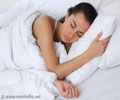E-reading actually may cause a shift in the circadian clock, contrary to the belief that it helps one sleep at night, harming your sleep quality, found scientists.

Exposure to light during evening and early nighttime hours suppresses release of the sleep-facilitating hormone melatonin and shifts the circadian clock, making it harder to fall asleep at bedtime.
Anne-Marie Chang, assistant professor of biobehavioral health at Penn State, said that electronic devices emit light that was short-wavelength-enriched light, which has a higher concentration of blue light -- with a peak around 450 nm -- than natural light. This was different from natural light in composition, having a greater impact on sleep and circadian rhythms.
Chang and colleagues observed 12 adults for two weeks, comparing when the participants read from an iPad, serving as an e-reader, before bedtime to when they read from a printed book before bedtime. The researchers monitored the participants' melatonin levels, sleep and next-morning alertness, as well as other sleep-related measures.
She said that that their most surprising finding was that individuals using the e-reader were more tired and took longer to become alert the next morning. This had real consequences for daytime functioning, and the effects might be worse in the real world as opposed to the controlled environment we used.
The researchers measured the amount of brightness coming from several devices, including an iPad, iPhone, Kindle, Kindle Fire and Nook Color. The Kindle e-reader does not emit light, while the iPad, Kindle Fire and Nook Color emit similar amounts of light. However, the iPad is the brightest of the devices measured.
Advertisement
Source-ANI









